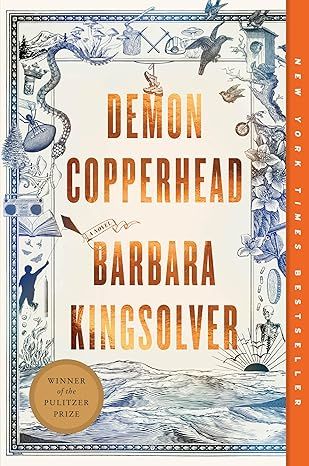Demon Copperhead: A Novel
4.6
-
110,129 ratings
WINNER OF THE PULITZER PRIZE • WINNER OF THE WOMEN'S PRIZE FOR FICTION
New York Times Readers’ Pick: Top 100 Books of the 21st Century • An Oprah’s Book Club Selection • An Instant New York Times Bestseller • An Instant Wall Street Journal Bestseller • A #1 Washington Post Bestseller • A New York Times "Ten Best Books of the Year"
"Demon is a voice for the ages—akin to Huck Finn or Holden Caulfield—only even more resilient.” —Beth Macy, author of Dopesick
"May be the best novel of [the year]. . . . Equal parts hilarious and heartbreaking, this is the story of an irrepressible boy nobody wants, but readers will love.” —Ron Charles, Washington Post
From the acclaimed author of The Poisonwood Bible and The Bean Trees, a brilliant novel that enthralls, compels, and captures the heart as it evokes a young hero’s unforgettable journey to maturity
Set in the mountains of southern Appalachia, Demon Copperhead is the story of a boy born to a teenaged single mother in a single-wide trailer, with no assets beyond his dead father’s good looks and copper-colored hair, a caustic wit, and a fierce talent for survival. Relayed in his own unsparing voice, Demon braves the modern perils of foster care, child labor, derelict schools, athletic success, addiction, disastrous loves, and crushing losses. Through all of it, he reckons with his own invisibility in a popular culture where even the superheroes have abandoned rural people in favor of cities.
Many generations ago, Charles Dickens wrote David Copperfield from his experience as a survivor of institutional poverty and its damages to children in his society. Those problems have yet to be solved in ours. Dickens is not a prerequisite for readers of this novel, but he provided its inspiration. In transposing a Victorian epic novel to the contemporary American South, Barbara Kingsolver enlists Dickens’ anger and compassion, and above all, his faith in the transformative powers of a good story. Demon Copperhead speaks for a new generation of lost boys, and all those born into beautiful, cursed places they can’t imagine leaving behind.
Read more
Kindle
$16.99
Available instantly
Audiobook
$0.00
with membership trial
Hardcover
$19.79
Paperback
$19.79
Ships from
Amazon.com
Payment
Secure transaction
ISBN-10
0063251981
ISBN-13
978-0063251984
Print length
560 pages
Language
English
Publisher
Harper Perennial
Publication date
August 26, 2024
Dimensions
5.28 x 1.5 x 7.87 inches
Item weight
1.29 pounds
Popular highlights in this book
The wonder is that you could start life with nothing, end with nothing, and lose so much in between.
Highlighted by 1,174 Kindle readers
Never be mean in anything. Never be false. Never be cruel. I can always be hopeful of you.
Highlighted by 1,017 Kindle readers
It hit me pretty hard, how there’s no kind of sad in this world that will stop it turning. People will keep on wanting what they want, and you’re on your own.
Highlighted by 988 Kindle readers
Product details
ASIN :
B09QMHZ53K
File size :
4260 KB
Text-to-speech :
Enabled
Screen reader :
Supported
Enhanced typesetting :
Enabled
X-Ray :
Enabled
Word wise :
Enabled
Editorial reviews
"Demon is a voice for the ages—akin to Huck Finn or Holden Caulfield—only even more resilient. I’m crazy about this book, which parses the epidemic in a beautiful and intimate new way. I think it’s her best.” — Beth Macy, author of Dopesick
“Brilliant. . . . A page turner and Kingsolver’s best novel by far. . . . Kingsolver has some of Mark Twain in her, along with 21st-century gifts of her own. More than ever, she is our literary mirror and window. May this novel be widely read and championed.” — Minneapolis Star-Tribune
"May be the best novel of 2022...Equal parts hilarious and heartbreaking, this is the story of an irrepressible boy nobody wants, but readers will love….You may be reminded of another orphaned boy slipping through the country’s underbrush, just trying to stay out of trouble: Huck Finn. With Demon, Kingsolver has created an outcast equally reminiscent of Twain’s masterpiece, speaking in the natural poetry of the American vernacular….Kingsolver's best demonstration yet of a novel’s ability to simultaneously entertain and move and plead for reform." — Ron Charles, Washington Post
“If you’re familiar with the Charles Dickens classic, you’ll follow the story’s beats and chuckle….What keeps you turning the pages is the knowledge that Demon has a future. The novel ends on a note of hope...not every fate is decided by the circumstances of one’s birth.” — Associated Press
"There’s really nothing like being immersed in a Kingsolver novel. . . . Damon [is Kingsolver’s] bravest, most ambitious creation yet." — Los Angeles Times
“Kingsolver’s capacious, ingenious, wrenching, and funny survivor’s tale is a virtuoso present-day variation on Charles Dickens’ David Copperfield. . . . Kingsolver’s tour de force is a serpentine, hard-striking tale of profound dimension and resonance.” — Booklist (Starred Review)
“An epic…brimming with vitality and outrage….the rare 560-page book you wish would never end.” — People "Book of the Week"
“With its bold reversals of fate and flamboyant cast, this is storytelling on a grand scale. . . . As Demon discovers, owning his story—every part of it—and finding a way to tell it is how he’ll wrest some control over his life. And what a story it is: acute, impassioned, heartbreakingly evocative, told by a narrator who’s a product of multiple failed systems, yes, but also of a deep rural landscape with its own sustaining traditions.” — The Guardian
“Extraordinary. . . . Much like Douglas Stuart’s Shuggie Bain or Charles Dickens’ David Copperfield, Kingsolver’s epic is narrated by a self-professed screwup with a heart of gold . . . chock-full of cinematic twists and turns. It’s a book that demands we start paying attention to—and embracing—a long-ignored community and its people." — San Francisco Chronicle
"Kingsolver's new novel is her best in years. . . . The character of Damon is right up there with the best classic orphans of literatre. Believe me: you will root for this lost boy." — Pittsburgh Post-Gazette
“In Demon Copperhead…Kingsolver channels the voice of a disenfranchised boy lost in the failures of our social system. It's a testament to her storytelling mastery that this novel also illustrates how deeply intertwined our attitudes about nature are with our collective destiny. As always, her purpose is to make us think about the ways we all must look out for each other.” — Arizona Republic
“Absorbing….Readers see the yearning for love and wells of compassion hidden beneath Demon’s self-protective exterior…. Emotionally engaging is Demon’s fierce attachment to his home ground, a place where he is known and supported, tested to the breaking point as the opiate epidemic engulfs it…. An angry, powerful book seething with love and outrage for a community too often stereotyped or ignored.” — Kirkus Review (Starred Review)
“A deeply evocative story…Kingsolver’s account of the opioid epidemic and its impact on the social fabric of Appalachia is drawn to heartbreaking effect. This is a powerful story, both brilliant in its many social messages regarding foster care, child hunger, and rural struggles, and breathless in its delivery.” — Publishers Weekly (Starred Review)
“Kingsolver brings a notably different energy from her previous work to Demon Copperhead…through a tremendous narrative voice, one so sharp and fresh as to overwhelm the reader’s senses….Demon’s spirit comes through, and it is haunting. It’s the reason the pages keep turning….Kingsolver has made this story her own, and what a joy it is to slip into this world and inhabit it, even with all its challenges.” — BookPage
“Demon Copperhead is a propulsive reading experience, energetic and funny while still conveying Kingsolver’s fury at the institutions that have let her community down.” — Slate
“You’ll be enthralled by [Demon’s] voice, simultaneously hilarious and wise, as he illuminates life in rural America…..this is the ideal late-fall read to sink your teeth into.” — Real Simple
“A dazzling novel….a lyrical re-dreaming of Dickens’s David Copperfield. The social injustices of Victorian England have been transplanted, with spellbinding success, to modern-day Appalachia…populated by America’s rural white underclass and now ravaged by the opioid crisis…Kingsolver maintains an astonishing level of energy and intensity….This novel is surely a highpoint of Kingsolver’s long career and a strong early candidate for next year's Booker Prize.” — Times Literary Supplement
“A riveting, epic tale…[Kingsolver’s] exquisite writing takes a wrenching story and makes it worthwhile… Kingsolver has given us a superb novel.” — Christian Science Monitor
"A heartrending, probing and ultimately hopeful tale about a young boy’s journey from devastation to survival….It’s hard to ascertain which is more brilliant, Kingsolver’s skill in modernizing Dickens’ narrative or the voice she gives to the privations and adversities facing the land and people she so dearly loves.” — Atlanta Journal-Constitution
"This is storytelling at its best. The voice rings true and so do the incidents." — Stephen King
Read more
Sample
1
First, I got myself born. A decent crowd was on hand to watch, and they’ve always given me that much: the worst of the job was up to me, my mother being let’s just say out of it.
On any other day they’d have seen her outside on the deck of her trailer home, good neighbors taking notice, pestering the tit of trouble as they will. All through the dog-breath air of late summer and fall, cast an eye up the mountain and there she’d be, little bleach-blonde smoking her Pall Malls, hanging on that railing like she’s captain of her ship up there and now might be the hour it’s going down. This is an eighteen-year-old girl we’re discussing, all on her own and as pregnant as it gets. The day she failed to show, it fell to Nance Peggot to go bang on the door, barge inside, and find her passed out on the bathroom floor with her junk all over the place and me already coming out. A slick fish-colored hostage picking up grit from the vinyl tile, worming and shoving around because I’m still inside the sack that babies float in, pre-real-life.
Mr. Peggot was outside idling his truck, headed for evening service, probably thinking about how much of his life he’d spent waiting on women. His wife would have told him the Jesusing could hold on a minute, first she needed to go see if the little pregnant gal had got herself liquored up again. Mrs. Peggot being a lady that doesn’t beat around the bushes and if need be, will tell Christ Jesus to sit tight and keep his pretty hair on. She came back out yelling for him to call 911 because a poor child is in the bathroom trying to punch himself out of a bag.
Like a little blue prizefighter. Those are the words she’d use later on, being not at all shy to discuss the worst day of my mom’s life. And if that’s how I came across to the first people that laid eyes on me, I’ll take it. To me that says I had a fighting chance. Long odds, yes I know. If a mother is lying in her own piss and pill bottles while they’re slapping the kid she’s shunted out, telling him to look alive: likely the bastard is doomed. Kid born to the junkie is a junkie. He’ll grow up to be everything you don’t want to know, the rotten teeth and dead-zone eyes, the nuisance of locking up your tools in the garage so they don’t walk off, the rent-by-the-week motel squatting well back from the scenic highway. This kid, if he wanted a shot at the finer things, should have got himself delivered to some rich or smart or Christian, nonusing type of mother. Anybody will tell you the born of this world are marked from the get-out, win or lose.
Me though, I was a born sucker for the superhero rescue. Did that line of work even exist, in our trailer-home universe? Had they all quit Smallville and gone looking for bigger action? Save or be saved, these are questions. You want to think it’s not over till the last page.
It was a Wednesday this all happened, which supposedly is the bad one. Full of woe etc. Add to that, coming out still inside the fetus ziplock. But. According to Mrs. Peggot there is one good piece of luck that comes with the baggie birth: it’s this promise from God that you’ll never drown. Specifically. You could still OD, or get pinned to the wheel and charbroiled in your driver’s seat, or for that matter blow your own brains out, but the one place where you will not suck your last breath is underwater. Thank you, Jesus.
I don’t know if this is at all related, but I always had a thing for the ocean. Usually kids will get fixated on naming every make and model of dinosaur or what have you. With me it was whales and sharks. Even now I probably think more than the normal about water, floating in it, just the color blue itself and how for the fish, that blue is the whole deal. Air and noise and people and our all-important hectic nonsense, a minor irritant if even that.
I’ve not seen the real thing, just pictures, and this hypnotizing screen saver of waves rearing up and spilling over on a library computer. So what do I know about ocean, still yet to stand on its sandy beard and look it in the eye? Still waiting to meet the one big thing I know is not going to swallow me alive.
Dead in the heart of Lee County, between the Ruelynn coal camp and a settlement people call Right Poor, the top of a road between two steep mountains is where our single-wide was set. I wasted more hours up in those woods than you’d want to count, alongside of a boy named Maggot, wading the creek and turning over big rocks and being mighty. I could go different ways but definitely a Marvel hero as preferable to DC, Wolverine being a favorite. Whereas Maggot tended to choose Storm, which is a girl. (Excellent powers, and a mutant, but still.) Maggot was short for Matt Peggot, related obviously to the screaming lady at my birthday party, his grandmother. She was the reason Maggot and I got to be next-door-neighbor wild boys for a time, but first he’d need to get born, a little out ahead of me, plus getting pawned off on her while his mom took the extended vacay in Goochland Women’s Prison. We’ve got story enough here to eff up more than one young life, but it is a project.
Famously, this place where we lived was known to be crawling with copperheads. People think they know a lot of things. Here’s what I know. In the years I spent climbing around rocks in all the places a snake likes to lie, not one copperhead did we see. Snakes, yes, all the time. But snakes come in kinds. For one, a common spotty kind called a Water Devil that’s easily pissed off and will strike fast if you make that mistake, but it’s less of a bite than a dog deals out, or a bee sting. Whenever a water snake gets you, you yell all the curse words you’ve got stored up in your little skull closet. Then wipe off the blood, pick up your stick, and go on being an Adaptoid, thrashing on the mossy stump of evil. Where, if a copperhead gets you, that’s the end of whatever you planned on doing that day, and maybe with that part of your hand or foot, period. So it matters a lot, what you’re looking at.
If you care, you’ll learn one thing from another. Anybody knows a sheepdog from a beagle, or a Whopper from a Big Mac. Meaning dogs matter and burgers matter but a snake is a freaking snake. Our holler was full of copperheads, said the cashiers at the grocery whenever they saw our address on Mom’s food stamps envelope. Said the school bus driver, day in, day out, snapping the door shut behind me like she’s slamming it on their pointy snake faces. People love to believe in danger, as long as it’s you in harm’s way, and them saying bless your heart.
Years would come and go before I got to the bottom of all the heart-blessing, and it was not entirely about snakes. One of Mom’s bad choices, which she learned to call them in rehab, and trust me there were many, was a guy called Copperhead. Supposedly he had the dark skin and light-green eyes of a Melungeon, and red hair that made you look twice. He wore it long and shiny as a penny, said my mother, who clearly had a bad case. A snake tattoo coiled around his right arm where he’d been bit twice: first in church, as a kid trying for manhood among his family’s snake-handling men. Second time, later on, far from the sight of God. Mom said he didn’t need the tattoo for a reminder, that arm aggravated him to the end. He died the summer before I was born. My messed-up birthday surprised enough people to get the ambulance called and then the monster-truck mud rally of child services. But I doubt anybody was surprised to see me grow up with these eyes, this hair. I might as well have been born with the ink.
Mom had her own version of the day I was born, which I never believed, considering she was passed out for the event. Not that I’m any witness, being a newborn infant plus inside a bag. But I knew Mrs. Peggot’s story. And if you’d spent even a day in the company of her and my mom, you would know which of those two lotto tickets was going to pay out.
Mom’s was this. The day I was born, her baby daddy’s mother turned up out of the blue. She was nobody Mom had ever met nor wanted to, given what she’d heard about that family. Snake-handling Baptist was not the half of it. These were said to be individuals that beat the tar out of each other, husbands belting wives, mothers beating kids with whatever object fell to hand, the Holy Bible itself not out of the question. I took Mom’s word on that because you hear of such things, folks so godly as to pass around snakes, also passing around black eyes. If this is a new one on you, maybe you also think a dry county is a place where there’s no liquor to be found. Southwest Virginia, we’re one damn thing after another.
Supposedly by the time this lady showed up, Mom was pretty far gone with the pains. The labor thing coming at her out of nowhere that day. Thinking to dull the worst of it, she hit the Seagram’s before noon, with enough white crosses to stay awake for more drinking, and some Vicodin after it’s all a bit too much. Looks up to see a stranger’s face pressed so hard against the bathroom window her mouth looks like a butt crack. (Mom’s words, take or leave the visual.) The lady marches around through the front door and tears into Mom with the hell and the brimstone. What is she doing to this innocent lamb that Almighty God has put in her womb? She’s come to take her dead son’s only child from this den of vice and raise her up decent.
Mom always swore that was the train I barely missed: getting whisked off to join some savage Holy Roller brood in Open Ass, Tennessee. Place name, my own touch. Mom refused to discuss my father’s family at all, or even what killed him. Only that it was a bad accident at a place I was never to go called Devil’s Bathtub. Keeping secrets from young ears only plants seeds in between them, and these grew in my tiny head into grislier deaths than any I was supposed to be seeing on TV at that age. To the extent of me being terrified of bathtubs, which luckily we didn’t have. The Peggots did, and I steered clear. But Mom stuck to her guns. All she would ever say about Mother Copperhead was that she was a gray-headed old hag, Betsy by name. I was disappointed, wishing for a Black Widow head of kick-ass red hair, at the least. This being the only kin of my father’s we were likely to see. When your parent clocks out before you clock in, you can spend way too much of your life staring into that black hole.
But Mom saw enough. She lived in fear of losing custody, and gave her all in rehab. I came out, Mom went in, and gave it a hundred percent. Gave and gave again over the years, getting to be an expert at rehab, like they say. Having done it so many times.
You can see how Mom’s story just stirred up the mud. Some lady shows up (or doesn’t), offers me a better home (or not), then leaves, after being called a string of juicy cusswords (knowing Mom) that would have left the lady’s ears ringing. Did Mom make up her version to jerk me around? Was it true, in her scrambled brain? Either way, she was clear about the lady coming to rescue a little girl. Not me. If this was Mom’s fairy tale: Why a girl? Was that what she really wanted, some pink package that would make her get her act together? Like I wasn’t breakable?
The other part, a small thing, is that in this story Mom never spoke my father’s name. The woman is “the Woodall witch,” that being my dad’s last name, with no mention of the man that got her into the baby fix. She found plenty to say about him at other times, whenever love and all that was her last stop on the second six-pack. The adventures of him and her. But in this tale as regards my existence, he is only the bad choice.
2
My thinking here is to put everything in the order of how it happened, give or take certain intervals of a young man skunked out of his skull box, some dots duly connected. But damn. A kid is a terrible thing to be, in charge of nothing. If you get past that and grown, it’s easiest to forget about the misery and pretend you knew all along what you were doing. Assuming you’ve ended up someplace you’re proud to be. And if not, easier to forget the whole thing, period. So this is going to be option three, not proud, not forgetting. Not easy.
I remember I always liked looking at things more than talking about them. I did have questions. My problem was people. Thinking kids are not enough full-fledge humans to give them straight answers. For instance. The Peggots next door in their yard had a birdhouse on a pole that was a big mess of dangling gourds, with holes drilled for the bird doors. It was the bird version of these trailer pileups you’ll see, where some couple got a family going and nobody, not kids nor grandkids, ever moved out. They’re just going to keep shacking up and hauling in another mobile home to set on blocks, keeping it one big family with their junkass porches and raggedy flag over the original unit. One Nation Under Employed. The Peggot birdhouse was that, a bird-trailer clusterfuck. But no birds lived in it, ever. There were bird nests galore in the trees behind the house, or they’d build one in some random place like under the hood of Mr. Peggot’s truck. Why not move into a house already built, free of charge? Mr. Peggot said birds were like anybody, they like living their own way. He said he’d known government housing that didn’t cost much more than a birdhouse to move into, just as unpopular.
Fine, but why keep the thing up there, growing mold? Maggot told me Humvee had made it in Shop. Humvee being one of Maggot’s uncles, last seen near a schoolhouse around the time of the Bee Gees or Elvis. By now it’s the nineties. The Peggots kept this reject birdhouse up its pole all those years for what, to remember their son Humvee by? I didn’t buy it. The Peggots had seven kids altogether, living as far away as Ocala Florida or as close as a mile away. Cousins without number roamed through that house like packs of half-broke animals with meal privileges. Every family member got talked to or talked about on a daily basis, except two: (1) Maggot’s mom, (2) Humvee. One doing time in Goochland, one dead, for undiscussed reasons.
Besides the birdless birdhouse, they had a dog pen with no dog. Mr. Peggot used to run hounds before he got too tired for it like all the old men we knew, back whenever they still had the lungs for it, and dogs had foxes or bears to chase up a tree. In fall time he’d take us to the woods to hunt ginseng or dig sassafras because those can’t outrun you. But mainly just to be out there. He knew bird tunes the way people know who’s on the radio. After we got old enough to handle a rifle, nine or ten, he showed us how to take a buck, and how to heft up the carcass on the tree branch over the driveway to dress it out, letting loops of guts fall out steaming on the gravel. Mrs. Peggot cooked venison roast in the crockpot. You’ve not eaten till you’ve had that.
The empty dog pen stood between our trailer and the Peggot house. Maggot and I would put a tarp over it and sleep out there, usually if falling trees someplace took out the lines and we couldn’t watch TV. One summer we did that for maybe a month, after a Nintendo Duck Hunt challenge where I accidentally let fly the controller gun and busted the screen. Maggot took credit for that deed so I wouldn’t get sent home and skinned alive. Mrs. Peggot pretended to take his word for it, even though she heard the whole thing. Probably everybody has had some golden patch of life like that, where everything was going to be okay thanks to the people that had your back, and sadly you wasted it, by being ticked off over some ignorant thing like a busted TV.
The Peggot house sat up at the top of the road with woods all around. They had chickens at one time, including this rooster with the mind of a serial killer that gave me bad dreams. But not farmers proper. Likewise not the churchiest of people, but they were the ones that took me. Mom despised church, due to some of her fosters getting carried away with it, but I myself didn’t mind. I liked looking at the singing women, and the rest you could sleep through. Plus that thing of being loved automatically, Jesus on your side. Not a faucet turned on or off, like with people. But some of the Bible stories I minded, definitely. The Lazarus deal got me mentally disturbed, thinking my dad could come back, and I needed to go find him. Mrs. Peggot told Mom I ought to go see Dad’s grave in Tennessee, and they had a pretty huge fight. Maggot calmed me down by explaining Bible stories were a category of superhero comic. Not to be confused with real life.
As a kid you just accept different worlds with different rules, even between some houses and others. The Peggot home being a place where things got put where they went. Mr. Peggot would come home with the groceries and right away, in they’d go to the refrigerator. Maggot and I would get done having our World War III in the living room, and those Legos and crap got picked up before we went outside, or else hell would be paid. Not so at my house, where milk seemed like it had its own life to live and would sit out on the counter till it turned. Mom always said she’d lose her mind if it wasn’t screwed in, and she wasn’t wrong. Her work ID badge on the back of the toilet, makeup by the kitchen sink, purse outside under a chair. Shoes wherever. That was just Mom. In my room I tried to keep stuff put away, mainly my action figures and the notebooks I kept for my drawings. I asked Mom one time how to fix the bed so it was covered up like you see them on TV, which she thought was dead hilarious.
We kids roamed wide, sometimes as far as the old coal camps with the little row houses like Monopoly, except not all alike anymore due to idle mischief and the various ways a roof can cave in. We’d play king of the hill on the tipple cones and come home with white eyelids in coal-black faces like old miners we’d seen in photo albums. Or we’d mess around in creeks. Not the unmentionable one of Devil’s Bathtub, which freaked Mom out, and anyway was over in Scott County. The best place by far was the little branch that ran right behind our houses, as a place for a boy to turn invisible. Water with its own ideas, moving around under all those rocks. And underneath the water, a kind of mud that made you feel rich—leaf smelling, thick, of a color that you wanted to eat. Peggot’s Branch, it was called, the Peggots being who had lived there longest. Their house was built by some previous Peggot before any other houses were up there, whenever it was one big farm where they plowed their tobacco with mules. So said Mr. Peggot. Mules being the only way you could farm on land that steep. On a tractor you’d roll it and kill yourself.
The trailer where Mom and I lived was technically a Peggot trailer, former home of Maggot’s aunt June before she moved to Knoxville. Mom rented it from the Peggots, which was probably why they kept an eye and helped her out, like Mom was the second-string sub that came in off the bench after their own A-team daughter left the game. Maggot said June was still their favorite, even after she got her nursing degree and moved away. Which is saying a lot. Most families would sooner forgive you for going to prison than for moving out of Lee County.
To be clear, me and Mom were no kin of theirs, so this was not one of those family trailer pileups. Those shabby type of places show up on reality TV a lot more than reality in general, I think for the same reason people like to see copperheads where there aren’t any copperheads. The Peggots just had their house and the one extra single-wide. Nine or ten other families had their places up and down our road that were kept up very decent, and again, no relation.
But the Peggots were a thundering horde, no question. I was jealous of Maggot for the wealth of cousins he totally took for granted. Even the hot older girl cousins that were all “Oooh, Matty, I’d kill you for your eyelashes! No fair God wasted a face that pretty on a boy!” Then squealing because Maggot’s trying to give them arm burns, these buff cheerleader babes that honestly could kick his puny ass any day. There’s no way they were scared. It was just this routine they had, the girls saying their girl shit to Maggot, and him acting like he hates it.
And I’d be like, Really man? Yes, I get that pretty is one of those words a guy has to treat like it’s the clap and he’s got his balls to protect. The whole manhood situation with Maggot being complicated, to put it mildly. But this would happen with nobody around to judge him, just the cousins. And me, the cousinless jerk that would have paid money for some girl making that kind of fuss over me, and lying halfway on top of me in a dogpile once they’ve all settled down on the living room floor to watch Walker, Texas Ranger. Me, the jerk sitting by himself on the couch looking at my friend down there in that pile, thinking: Dude. Who hates being adored?
I’ve been saying Mrs. Peggot this and that, so I’ll go on writing it that way because the truth is embarrassing. I called her Mammaw. Maggot called her that, so I did too. I knew his cousins were not my cousins, nor was Mr. Peggot my grandpa, I called him Peg like everybody did. But I thought all kids got a mammaw, along with a caseworker and free school lunch and the canned beanie-weenies they gave you in a bag to take home for weekends. Like, assigned. Where else was I going to get one? No prospects incoming from Mom, foster-care orphan dropout. And the mother of Ghost Dad, already discussed. So I got to share with Maggot. This seemed fine with Mrs. Peggot. Other than my official sleeping place being at Mom’s, and Maggot having his own room upstairs in the Peggot house, she played no favorites: same Hostess cakes, same cowboy shirts she made for us both with the fringe on the sleeves. Same little smack on the shoulder with her knuckles if you cussed or wore your ball cap to her table. Not to say she ever hit hard. But Christ Jesus, the tongue-thrashings. To look at her, this small granny-type individual with her short gray hair and mom jeans and flat yellow sandals, you’re going to think: Nothing at all here to stand in my way. The little do you know. If you’re going to steal or trash-talk your betters or break her tomato plants or get caught huffing her hair spray out of a paper bag, the lady could scold the hair off your head.
She was the only one to use my real name after everybody else let it go, Mom included. I didn’t realize until pretty late in life, like my twenties, that in other places people stick with the names they start out with. Who knew? I mean, Snoop Dogg, Nas, Scarface, these are not Mom-assigned names. I just assumed every place was like us, up home in Lee County, where most guys get something else on them that sticks. Shorty or Grub or Checkout. It’s a good guess Humvee was not Humvee to begin with. Mr. Peggot was Peg after he got his foot crushed by one of those bolting machines they use in the coal mines. Some name finds you, and you come running to it like a dog until the day you die and it goes in the paper along with your official name that everybody’s forgotten. I have looked at the obits page and thought about how most of these names are harsh. Who wants to die an old Stubby? But in life it’s no big deal, you can buy a beer for your best friend Maggot without either one of you giving it a thought.
So it was not usual for Mrs. Peggot to keep my born name in the mix after others had moved on from it. It’s Damon. Last name of Fields, same as Mom’s. At the time of filling in the hospital forms after my action-packed birth, she evidently had her reasons for not tagging me to my dad. From what I know now, there’s no question, but looking like him was something I had to grow into, along with getting hair. And in those days, with her looks still being the main item in Mom’s plus column and the words “bad choice” yet to join her vocab, maybe there were other candidates. None on hand to gentleman up and sign over his name. Or drive her home from the hospital. That job, like most gentleman-up stuff in Mom’s life, fell to Mr. Peg. Was he happy about it or not, another story.
As far as the Damon part, leave it to her to pop out a candy-ass boy-band singer name like that. Did she think she’d even get me off her tits before people turned that into Demon? Long before school age, I’d heard it all. Screamin’ Demon, Demon Semen. But once I got my copper-wire hair and some version of attitude, I started hearing “Little Copperhead.” Hearing it a lot. And look, no red-blooded boy wants to be Little Anything. Advice to anybody with the plan of naming your kid Junior: going through life as mini-you will be as thrilling as finding dried-up jizz on the carpet.
But having a famous Ghost Dad puts a different light on it, and I can’t say I hated being noticed in that way. Around the same time Maggot started his shoplifting experiments, I was starting to get known as Demon Copperhead. You can’t deny, it’s got a power to it.
Read more
About the authors
Barbara Kingsolver
Barbara Kingsolver was born in 1955 and grew up in rural Kentucky. She earned degrees in biology from DePauw University and the University of Arizona, and has worked as a freelance writer and author since 1985. At various times she has lived in England, France, and the Canary Islands, and has worked in Europe, Africa, Asia, Mexico, and South America. She spent two decades in Tucson, Arizona, before moving to southwestern Virginia where she currently resides.
Her books, in order of publication, are: The Bean Trees (1988), Homeland (1989), Holding the Line: Women in the Great Arizona Mine Strike (1989), Animal Dreams (1990), Another America (1992), Pigs in Heaven (1993), High Tide in Tucson (1995), The Poisonwood Bible (1998), Prodigal Summer (2000), Small Wonder (2002), Last Stand: America's Virgin Lands, with photographer Annie Griffiths (2002), Animal, Vegetable, Miracle: A Year of Food Life (2007), The Lacuna (2009), Flight Behavior (2012), Unsheltered (2018), How To Fly (In 10,000 Easy Lessons) (2020), Demon Copperhead (2022), and coauthored with Lily Kingsolver, Coyote's Wild Home (2023). She served as editor for Best American Short Stories 2001.
Read more
Reviews
Customer reviews
4.6 out of 5
110,129 global ratings
Ga303
5
Easily one of the best books I read this year.
Reviewed in the United States on December 1, 2023
Verified Purchase
"Demon Copperhead" kept and kept on appearing in my "suggested for you" on Kindle, and each time, I kept thinking "Ugh, not so much, I just want something to read, but not sure if I really feel like turning on my thinking cap for Barbara Kingsolver." Finally, largely out of self-defense as I was so tired of seeing it, I caved and got the book. When I look back on all that I have read this year, or even over the past couple to few years, I can't imagine not having read it.
This book has been called a creative retelling of "David Copperfield." As to that, I will begin by saying not "I was born," but something far more provocative: I don't like Dickens. Sorry, I don't, despite having taken (or possibly because of having taken) an entire Senior English Seminar on his works in college. In that semester-long class, I was exposed to most of everything he'd written, including "David Copperfield," and did what I had to do to participate in classroom discussion and achieve a grade. Shortly after that, I largely forgot "David Copperfield" and its characters or situations, so I read "Demon Copperhead" cover-to-cover without recognizing the parallels. It wasn't until after I finished the book and took a quick trip to Wikipedia that I saw how creatively these were done, from plot events to character names, and was impressed. (And for those reviewers who have said this is "plagiarism," no, a retelling of an existing story is not plagiarism.)
Rather than Dickens' coal-choked, vice-ridden, poverty-stricken 19th century London, the setting has been transported here to Appalachian Virginia, more or less in the present day. The titular character's surroundings are beautifully done, as Kingsolver's descriptions always are, and the reader is immediately immersed in his life's adventures and misadventures, from young childhood to young adulthood.
I found the narrative voice of his childhood to be particularly effective. A child's perceptions of his world, however intuitive, are often incorrect or entirely made up based on emotions such as love or fear. Child Demon's voice felt very believable to me (and many times was cause for a chuckle, a chuckle not being easy to come by in a story with as many dark themes as this one has). From there, it is interesting to read a gifted writer changing the narrative voice as the character gets older.
As always, always, always (and my favorite attribute of Barbara Kingsolver's writing), the descriptions of nature are wonderful and meticulously detailed, especially as seen through the perception of a child. (In one example, the character Maggot is observed by Demon to be holding a tiny, tiny grasshopper, so small it seemed to have come from "a planet of smaller things.")
In being with Demon from childhood into young adulthood, we see a character who goes from fearing Boogeymen which live largely in his imagination to confronting Boogeymen which are real -- in this case poverty, the flaws of the foster care system, the manipulation of the people of this region by big business and government, and the horrors of the opioid crisis.
I came across a number of reviews from readers who felt the depiction of the latter was one-sided and had very strong opinions about it -- I'm not here to debate that -- or that the themes of the book were too heavy-handed. And granted, while many (self included) believe that some of Barbara's Kingsolver's books are too heavy-handed in terms of social or ecological agendas, I felt this was much more subtle in "Demon Copperhead" and did not find the themes overbearing at all -- possibly because the reader is experiencing things through the eyes of a very well-developed character, rather than through the words or actions of less-developed characters in some of her other books where characters feel like devices and not people.
Some say Dickens beat readers over the head with themes, too. Much as he may not be my favorite writer, however, I feel that he did a good enough job of creating a world and characters that he didn't have to beat anyone over the head with anything. I feel Kingsolver has achieved that here, too. Understanding the ugliness of a society as perceived by a believable character -- and feeling sad, appalled, ashamed, what-have-you -- is not the same as being hit over the head by something.
There's some dark, dark stuff here, so fair warning: readers who aren't prepared for that had best pick up another selection. And if this isn't your cup of tea, please do that rather than drag down reviews of this one with expressions of shock about the "trash" herein. Things like sex, death by OD, people shooting up, etc., are part of this story.
As others have said, however, I am flabbergasted by the fact that Amazon's age suggestion for this book is "ages 9 and up." While there may be 9-year-olds at a reading level sufficient to comprehend the words, this book is not kid stuff.
While a 70% five-star rating is a suggestion of the widespread appreciation for "Demon Copperhead," there are, as always, other percentages of readers who liked it less or even hated it (which is the beauty of the right to freely express an opinion, or to admit that something is simply not to one's taste).
If I had a nickel for every review that said this was a horrible book or a suggestion that Kingsolver has fallen off her game and ended by saying "Go read 'The Poisonwood Bible'," I'd be a rich reader indeed.
I'll end by saying I did "go read 'The Poisonwood Bible'." (Twice, actually, well before reading this one.) And this reader liked "Demon Copperhead" way better.
Read more
159 people found this helpful
susan
5
POWERFUL! Depressing, energizing, totally engrossing.
Reviewed in the United States on July 9, 2024
Verified Purchase
Demon Copperhead is without a doubt the most powerful novel I've read in 25 years. Or more. (I read 20-30 novels a year, minimum. I devour good literature.) Yes, Kingsolver modeled her blockbuster novel after David Copperfield, BUT I declare her the TOLSTOY of our modern age. She's far beyond Dickens, who was great, of course, but not one of the world's finest writers, by any means. Tolstoy, on the other hand, is way up there. And Kingsolver is way, way up there. This is some of the finest writing I've ever read. Kingsolver's understanding of human emotion and human attachment, and her ability to capture these, is beyond fabulous, Her grasp of the sweep of history behind her characters, and within her characters, creates a depth not found elsewhere. Her depiction of people bound to each other, to their community, to the earth, to a way of life they will never escape—nor want to—is her gift to humanity. Appalachia is a world unto itself, and yet it is a world we can (and should) all identify with, a world where people care for each other and are bound to each other by love, by need, by experience, by joys and sorrows. By human experience. This is a book of nightmares. And of wild-eyed dreams. Of far-flung expectations, and deep hope. Tolstoyan, at its best. This is a book for the ages. It will be as relevant in 2124 and 2224 as it is now. This book should be assigned to every single junior in high school. This is the book that promises to grab every young person and never let go.
Read more
25 people found this helpful
Mark Stevens
5
Copperhead Road
Reviewed in the United States on January 7, 2024
Verified Purchase
In an interview with Ezra Klein on his podcast, Barbara Kingsolver said she wanted to write “the great Appalachian novel.” She conceded, however, that the notion “probably sounds ridiculous.”
In particular, Kingsolver said she wanted to write about the fact that the people who live in Appalachia “are the most resourceful Americans you’re probably going to find anywhere.” Kingsolver, who was raised in rural Kentucky and now lives in rural Virginia, said she wanted to explore the shame she had internalized from her choice of a place to live.
“How many people well-meaning people have asked me, ‘how could I live there in the middle of nowhere?’” said Kingsolver. “People, this is my everywhere. This is my everything.”
Later in the chat: “Everybody looks down on the country people and the country people sort of absorb that. You can’t help but absorb it. So when I set out to write my great Appalachian novel. I was paralyzed with self-doubt because, I mean, my starting point was that I wanted to write about the opioid epidemic, which is become a huge assault on our culture, our families, our communities. It’s devastated so many of the good things about this region that we value and that we love. And so I wanted to write about these kids who’ve been damaged and this place that’s been damaged, and it seemed like a really hopelessly sad story. Plus, it’s about people that I didn’t feel the outer world cared about. And so I just really, I spent a couple of years walking around and around this story, trying to figure out how to break into that house because I really felt sure nobody wants to read it.”
Well, Kingsolver was wrong. At least, she was wrong about the interest in her topic—not her take on the people of Appalachia. Winner of the Pulitzer Prize for fiction and 85,000+ ratings on Amazon (4.6 stars).
There’s so much to like about Demon Copperhead but one of the main things is that it’s so breezily readable. For a 546-page epic, it goes down fast. It’s episodic, a la Dickens, but the character flow is organic, unforced. Demon’s voice is engaging and his struggles are real, particularly when it comes to the challenges of the foster care system and the brutality of OxyContin addictions. Kingsolver’s empathy for addicts comes pouring out of the story. She is non-judgmental, plays it straight.
Here is Demon, somewhat early on, looking back on the power of addiction: “I had roads to travel before I would know it’s not that simple, the dope versus the person you love. That a craving can ratchet itself up and up inside a body and a mind, at the same time that body’s strength for tolerating is favorite drug goes down and down. That the longer you’ve gone hurting between fixes, the higher the odds that you’ll reach too hard for the stars next time. That first big rush of relief could be your last. In the long run, that’s how I’ve come to picture Mom at the end: reaching as hard as her little body would stretch, trying to touch the blue sky, reaching for some peace.”
That’s as good a passage about the feeling of addiction, and a description of its power, that I’ve ever read. (Kingsolver also read that section on Klein’s podcast.)
Kingsolver is a deceiving writer. Her style is unassuming and keen-eyed. The text is full of specificity. And energy. If you have any doubts about tackling this book because it looks too heavy, squash those notions. Here’s the beginning of Chapter 34:
“A lot of firsts that school year. First scrimmage, first JV game, first tackle, first passing yards made. First school dance, with an eighth-grader girl that was dead serious about it. So, my first real date, evidently. Angus and Sax went together dressed as Planet of the Apes, loser of their grade contest (Sax) being the human on a leash. This is Homecoming mind you, not Halloween, so. Not a date. But Angus took mine over, ordered the corsage from Walmart, took me to Goodwill where we found this dope white suit from the sixties. In my size, unbelievable. I’ve grown into my hands and feet by this point, and I’m pushing 6 feet. Thank you, Mattie Kate.”
Mattie Kate is the housekeeper who worked for football Coach Wingate, where Demon lived while he was being developed as a potential football star. There are plenty of characters to keep track of, but Kingsolver gives them juicy nicknames (again, a la Dickens) or colorful descriptions so they are easy to track. U-Haul. Fast Forward. Waddles. Mouse. If you know David Copperfield (it’s been decades since I read it) you’ll have a great time with what Kingsolver did with her names. For instance, Uriah Heep becomes Ryan Pyles.
The “resourcefulness” of Demon is apparent in his stubborn ability to survive. He’s smarter than he acknowledges, and very observant. In Demon Copperhead, bad things happen to bad people and bad things happen to good people, too. Many around Demon are not so fortunate and literally or metaphorically drown. You can’t help but think about the failure of our institutions around child welfare, the foster care system, adult welfare, and drug abuse. But Demon finds his talent, develops a passion, and puts it to use. Hello, the power of art. And love. Every great novel, and this is one, is a love story in the end.
Demon Copperfield was written with passion for Kingsolver’s very personal reasons. The execution is a thing of beauty—and something we can all admire.
Read more
204 people found this helpful
Top Barbara Kingsolver titles
View all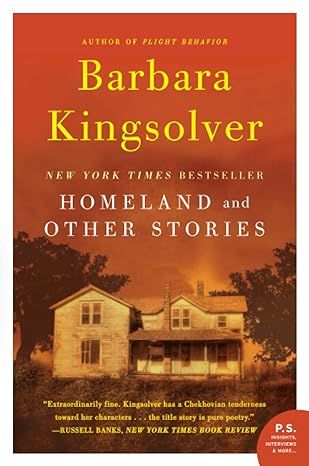
Homeland: And Other Stories
4.2
-
691
$5.24
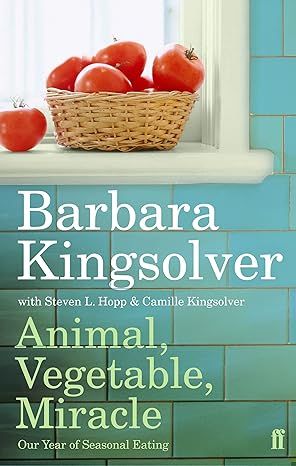
Animal, Vegetable, Miracle: Our Year of Seasonal Eating
4.5
-
2,496
$7.96

Animal Dreams: A Novel
4.4
-
2,888
$10.49
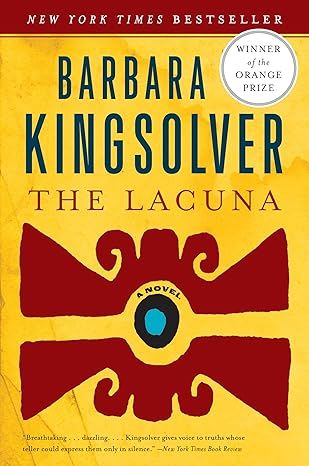
The Lacuna: A Novel (P.S.)
4.4
-
4,450
$1.77
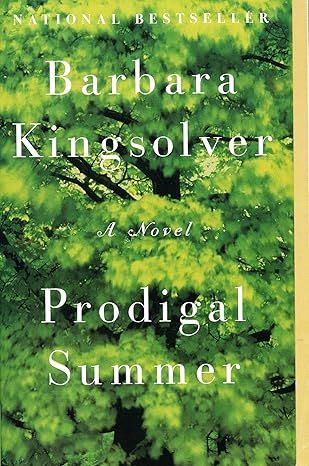
Prodigal Summer: A Novel
4.4
-
6,309
$8.99
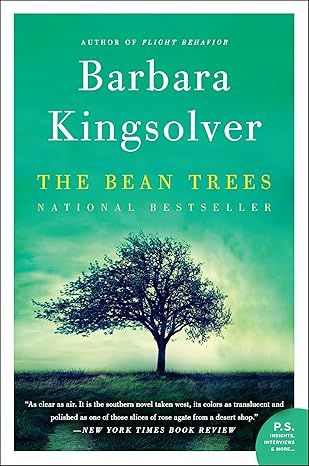
The Bean Trees Anniversary Edition: A Novel
4.4
-
11,504
$2.41
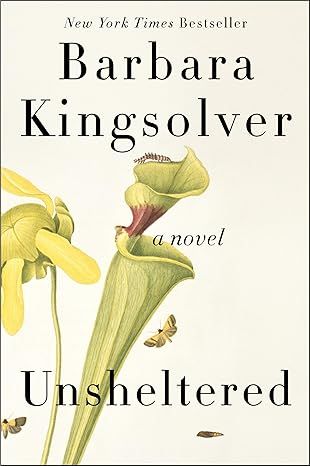
Unsheltered: A Novel
4.2
-
12,750
$5.24

Flight Behavior: A Novel
4.3
-
9,479
$1.84
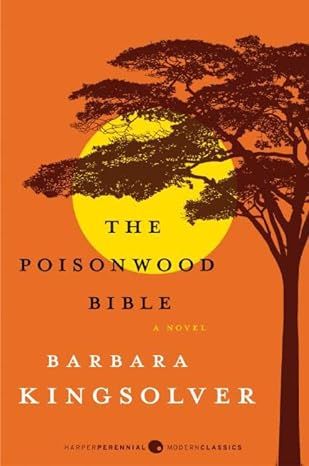
The Poisonwood Bible: A Novel
4.5
-
16,256
$12.69
Similar Books
Best sellers
View all
The Tuscan Child
4.2
-
100,022
$8.39

The Thursday Murder Club: A Novel (A Thursday Murder Club Mystery)
4.3
-
155,575
$6.33

Sapiens: A Brief History of Humankind
4.6
-
140,302
$13.49

The Butterfly Garden (The Collector, 1)
4.3
-
88,556
$9.59

Things We Hide from the Light (Knockemout Series, 2)
4.4
-
94,890
$11.66

The Last Thing He Told Me: A Novel
4.3
-
154,085
$2.99

The Perfect Marriage: A Completely Gripping Psychological Suspense
4.3
-
143,196
$9.47

The Coworker
4.1
-
80,003
$13.48

First Lie Wins: A Novel (Random House Large Print)
4.3
-
54,062
$14.99

Mile High (Windy City Series Book 1)
4.4
-
59,745
$16.19

Layla
4.2
-
107,613
$8.99

The Locked Door
4.4
-
94,673
$8.53
